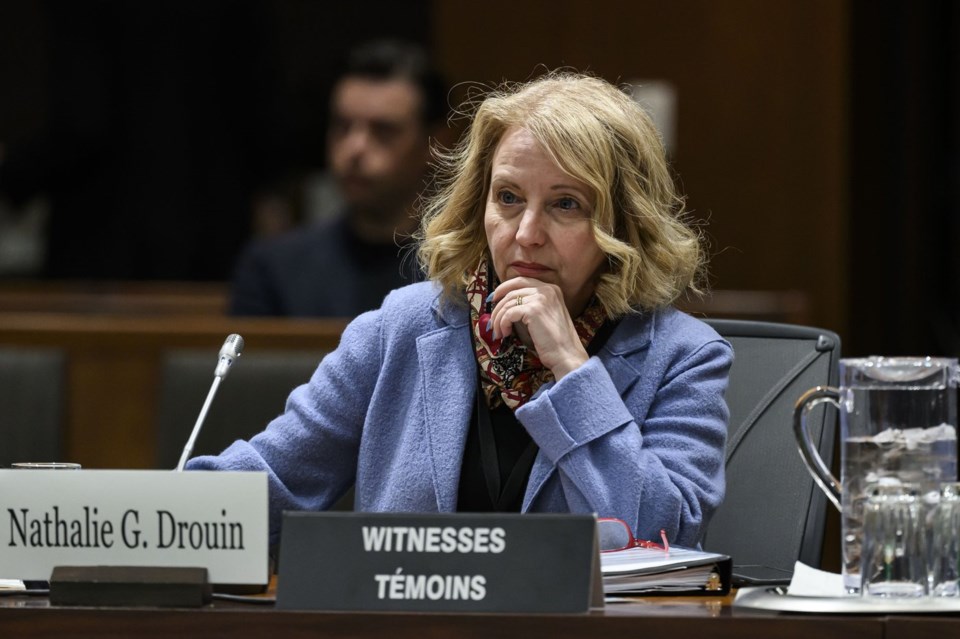OTTAWA — A newly released memo shows federal officials recommended almost a year ago that leaders of major opposition parties receive regular classified briefings — not only on foreign interference but also violent extremism and overseas conflicts.
The internal memo says the proposed briefings, to be co-ordinated by the Privy Council Office, would ensure security-cleared leaders, as well as designated alternates, are offered an "intelligence-informed understanding" of the threats facing Canadians.
The PCO, the federal unit that supports the prime minister, recently released the memo to The Canadian Press in response to an Access to Information request filed last year.
It comes as Conservative Leader Pierre Poilievre continues to face questions on the campaign trail about his refusal to seek the top secret-level clearance necessary to receive such briefings.
The May 10, 2024, memo to then-prime minister Justin Trudeau from national security and intelligence adviser Nathalie Drouin says the briefings would take place under a protocol drafted by the PCO.
"The protocol stipulates that briefings be provided on a need to know basis and that they could be either general in nature to raise awareness on a key issue (i.e. the Russia-Ukraine conflict) or more specific to a national security threat faced by a political party," the memo says.
"The purpose of all briefings, whether general or specific, is to ensure party leaders have access to the information required to support their decision making as head of a major political party and in the national interest of Canada."
Party leaders who accept the offer of briefings would need to go through a top secret-level security clearance process. The memo cautions the outcome of the process "cannot be predetermined."
Poilievre has said obtaining the clearance would amount to a gag order, forbidding him from speaking publicly about what he hears in classified briefings.
Poilievre's chief of staff does have top-secret clearance.
The memo notes that while individuals with high-level clearance must agree they will not divulge classified information, MPs have immunity to speak freely during parliamentary proceedings.
The protocol drafted by PCO "addresses these risks," the memo adds, without elaborating.
It says the PCO would outline security requirements to cleared individuals and if "inappropriate disclosure" occurs, "briefings would cease."
Privy Council Office spokesman Daniel Savoie said the briefing protocol, to be published in coming weeks, does not require parliamentarians to waive their immunity.
"The protocol lays out a rigorous process for ensuring accountability in the disclosure of information of a sensitive or classified nature in the course of these briefings," Savoie said in a written response to questions.
"This is intended to protect national security information, the disclosure of which could risk injury to Canada's national security, while equipping security cleared opposition leaders with intelligence-driven insights."
The government has confidence that parliamentarians who receive their clearances and these briefings "will understand the grave repercussions of publicly disclosing information," he added.
Savoie said the briefing protocol has not yet been put into effect.
Conservative spokesman Sam Lilly said the party "would certainly wish to review the details of any new measures provided to parliamentarians by the Privy Council Office prior to commenting."
He added that the government already has the ability to notify a leader of any issue that is particularly relevant to them and their party.
The proposal outlined in the May 2024 memo is not the first federal effort to provide opposition leaders with highly classified information on current topics.
Two years ago, NDP Leader Jagmeet Singh and Green Leader Elizabeth May underwent the process of obtaining top secret clearances so they could read the classified annex to a report by a special rapporteur on foreign interference. Bloc Québécois Leader Yves-François Blanchet subsequently obtained his security clearance.
Singh has also received briefings from the PCO on "select information relevant to Canada," the newly released memo says.
A federal inquiry into foreign interference said in its final report, released in January, that the forthcoming protocol would allow for regular classified briefings for leaders of all political parties with representation in the House of Commons at least twice a year. These would be in addition to occasional briefings.
The memo says the national security adviser, in consultation with members of the deputy minister committee on intelligence response, would approve the agendas, content and other messages to be delivered to party leaders during the planned regular briefings.
The PCO would work with the Prime Minister's Office to provide the prime minister with advance notice of the information to be given to opposition leaders, with the exception of a briefing during an electoral writ period.
The memo also says the offer to opposition leaders "could be nuanced" to indicate that, when leaders cannot attend a briefing, a security-cleared alternate member of their party could take part in their place.
"International partners including the U.S. and the U.K. regularly and successfully brief opposition leaders," the memo says. "Taking a similar approach offers the opportunity to both party leaders and select individuals in opposition parties (e.g. foreign affairs or public safety critic) to have intelligence-informed briefings on a regular basis."
May said she would welcome more regular briefings.
"I think it's an excellent idea," she said "The only politician I know who seems to prefer remaining in ignorance is Pierre Poilievre. But I think most of us would like to know more."
This report by The Canadian Press was first published April 11, 2025.
Jim Bronskill, The Canadian Press




